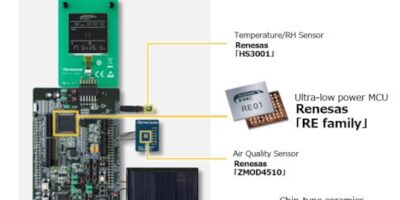Based on the Nvidia Jetson Xavier NI for AIoT applications, the AIE800-904-FL is Axiomteks’s latest AI embedded system. It is protected to IP67 and has a wide operating temperature range for use outdoors.
The AI inference system has a powerful six-core Nvidia Carmel Arm v8.2 (64-bit) processor and 384-core Nvidia Volta graphics processing unit (GPU). It offers accelerated computing and its IP67-rated housing protects from water and dust ingress. It is also rugged, with a wide operating temperature range of -30 to +50 degrees C and a vibration endurance for up to 3Grms.
The AIE800-904-FL is also equipped with M12 type I/O connectors and four waterproof N-jack antenna openings for operational stability in rugged environments. The Nvidia Jetson-based outdoor edge AI system is intended for use in outdoor applications such as traffic management, city security as well as smart manufacturing.
The AIE800-904-FL has 8Gbyte of LPDDR4x memory and 16Gbyte eMMC onboard. It has a wide range 100 to 240V AC power input with 10kV surge protection.
The AI inference system features one M.2 Key B 2242 SSD socket with a high-speed PCIe 2.0 x2 NVMe interface for storage. In addition, the embedded box PC is equipped with one GbE PoE port for IP camera video surveillance solutions including traffic flow monitoring, licence plate recognition, vehicle recognition, intrusion detection and access control.
The AIE800-904-FL brings computing capacity to the edge to enable AI applications directly on field devices, explained Annie Fu, a product manager, PM divison at Axiomtek.
The IP67-rated housing, industrial-grade anti-vibration, wide operating temperature capabilities and wide voltage AC input, with multiple M12-type I/Os, make the AIE800-904-FL suitable for severe applications in outdoor environments, Fu said. “Taking traffic management as an example, a high-performance system that can accurately detect, record, process, and transmit huge streams of data is indispensable for a smart city,” she concluded.
The AIE800-904-FL AI embedded system supports one C3 USB 2.0 port, one M12 X-Code Gigabit PoE port, one M12 S-Code connector for AC power supply and one C3 HDMI port supporting full HD. The four waterproof N-jack antenna openings provide flexibility for WLAN or WWAN. The AI rugged computer has a full-size PCI Express Mini Card as well as a SIM card slot for 4G/LTE/GPRS connections.
It supports the open source operating system Linux Ubuntu 18.04 which is highly customisable. It also integrates Allxon Device Management Solutions (Allxon DMS) to provide cost-effective and simplified device management with comprehensive remote management capabilities. The system can be wall- or VESA-mounted.







